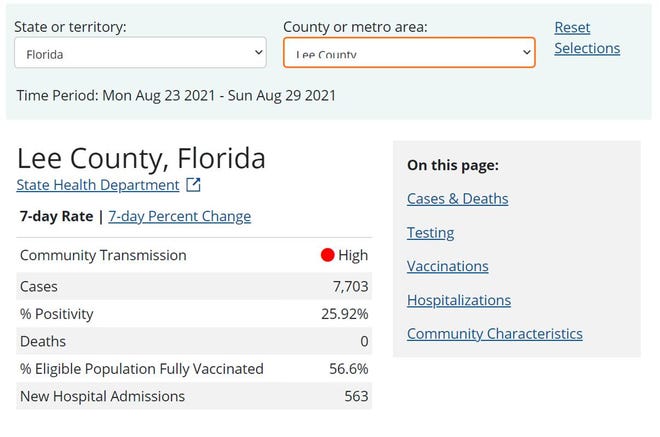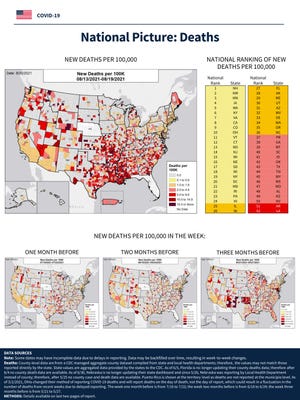Thanks to Florida State Representative Carlos Guillermo Smith and to public interest groups for suing over Florida's suppression of COVID-19 data. In the words of the late Senator Daniel Patrick Moynihan, "Secrecy is for losers." for people who don't value information and our Right to Know. One such fetid fellow is foolish Florida Governor RONALD DION DeSANTIS. It's time for him to go. From Fort Myers News-Press:
How many people have died of COVID-19 in your Florida community? State won’t tell you
COVID-19 killed one Floridian an average of about every four minutes last week, the second worst in the nation.
But for those wanting to know how many people are dying every day in their own communities – good luck. The state of Florida won’t say. Nor will most local public health officials. At least one county acknowledged it doesn’t know. Federal websites show either incomplete or inconsistent data for Florida's counties.
We know that Florida last week reported 2,345 COVID-19 deaths for the state. But, almost uniquely throughout the United States, Florida has not reported deaths at the county level for three months. The intensity of this worst wave of the pandemic in a given locale is anyone’s guess.
Governor on local data:DeSantis acknowledges need for county COVID-19 data, vows to challenge school mask mandates
Tracking down Florida’s local data:Two months later, finding Florida COVID data by county can be frustrating – but possible
Who's right? Federal and state data disagree on Florida's county-level COVID-19 deaths
The state Department of Health says to look to the Centers for Disease Control and Prevention’s website for county death tolls. But the number reported on one CDC webpage undercounts Florida's tally by thousands, and the CDC’s most prominent map of county-level COVID-19 deaths shows only blanks for each of the state's 67 counties.

The Florida Department of Health once reported county death tolls each day before switching to weekly reporting in early June. Spokeswoman Weesam Khoury gave no indication the department intends to return those local death statistics to its weekly reports, even though Gov. Ron DeSantis said at a Wednesday news conference that releasing local death totals would be “appropriate.”
“We are not hiding anything,” Khoury insisted in a phone interview Thursday. “When we give it to the CDC, it’s there.”
But any visitor to the “county view” section of the CDC's COVID-19 tracker web page won’t find county-level fatalities. As of Friday, the page’s U.S. map showed nothing but zeroes for Florida’s counties.
Khoury pointed to the CDC web page that shows the latest provisional death toll in each U.S. county as reported by the National Center for Health Statistics. But for 33 counties, that death count is lower than the state’s last county report in June.
When a reporter pointed out that the webpage is not an obvious place the public would look, Khoury replied, “I know. I wish it was. I can’t control the way the CDC publishes it.”
That site also requires viewers to manipulate a database to view their own county.
But the state can control whether or not it publishes those statistics in its own reports. When pressed on why the data don’t appear in the state’s weekly reports, Khoury replied, “If you don’t like those answers, I don’t know what else to tell you.”
Knowing death tolls ‘is extremely important’
Public health experts say local level pandemic information is invaluable.
Members of the public may see quickly rising deaths as a good reason to wear masks, be more mindful of social distancing or pull their kids from schools, they say. And, they note, hospital administrators need a warning if their morgues are about to run out of space.
Reporting up-to-date county COVID-19 death counts would “show the toll the pandemic has taken on the people in their community,” Florida International University epidemiologist Dr. Mary Jo Trepka said. “I think that would be really helpful because that could make some people take the pandemic more seriously.”
Florida blows past 2020 deaths:In just eight months, Florida’s 2021 COVID-19 death toll has surpassed 2020 total
Vaccine passports:Florida to issue $5,000 fines to businesses requiring proof of vaccination
And, she added, “It might help those people on the fence about getting vaccinated.”“Deaths versus number of people sick; knowing that number is extremely important,” said Dr. Jean Malecki, a former Palm Beach County health department director.
For public officials in positions such as the one she held, knowing these statistics can help a county health system “plan for the health care delivery system ... so people will get appropriately treated for the severity of the illness they have.”
If it were up to her, she said, Florida’s COVID-19 reporting would be daily, with death tolls for each county.
The way Florida currently reports COVID-19 data, Malecki said, “hides the reality of what people are facing and that’s just wrong. Anytime (the government) hides information, you question what’s going on. And you don’t trust. And when you lose the trust of the people you serve and the people’s lives you’re responsible for, that’s wrong.”
Common refrain: Go ask the state Health Department
The USA TODAY Network - Florida surveyed counties throughout the state and found a mishmash of local death reporting.
Only six county health departments could be found that have released their death tolls to the public: Brevard, St. Lucie, Martin, Flagler, Orange and Manatee. Brevard released its number of deaths only once.
Some counties are fortunate enough to have information-sharing dominant hospital systems or the rare, local Department of Health office that will provide such data. Others get no information, or partial information that has been released to another government agency that then released it to local media. Months of records requests to counties across Florida end up with the same refrain: Ask the state Health Department.
Representatives of at least one local branch of the Florida Department of Health, Collier County’s, say they don’t even have access to daily death counts.
The agency overseeing Florida’s hospitals, the Agency for Health Care Administration, said it does not collect COVID-19 death counts from medical facilities. An agency representative directed a reporter’s questions to the state Health Department.

Highly detailed pandemic dashboards operated by the CDC and other independent COVID-19 trackers show no deaths in individual Florida counties, even though local death statistics are available for most other states. Charts of deaths over time in the counties dropped to zero months ago.
Only Florida and Nebraska stand out nationwide in CDC reporting for having no information on county-level mortality. A CDC profile of Florida’s COVID-19 impact shows no county data on deaths for the past two months.
The CDC declined to comment, directing reporters to the Florida Department of Health.
Some county-level daily information exists. State staffers send probable, but unconfirmed, COVID-19 deaths, including the deceased’s county of origin, to the National Center for Health Statistics. This is the provisional data the CDC posts.

But Jason Salemi, an associate professor of epidemiology at the University of South Florida College of Public Health, says that database is sometimes out of date and includes most, but likely not all, actual fatalities.
Salemi doesn’t know why the CDC’s county tracker site is reporting zero deaths in Florida counties.
He said he spoke with a state epidemiologist who was surprised that those numbers weren’t visible, though that has been the case for months, according to the CDC’s own illustrations on death counts nationally.
“My suspicion is that somebody thinks it’s being reported,” he said. “Maybe it’s not reported in the format to be able to be displayed? I don’t know. But it seems to me that the Department of Health was under the impression that this information was being received by the CDC. Interesting.”
One apparent reason CDC and state health department numbers don’t agree is that the CDC bases its county total on the location where someone dies, usually a hospital, according to a Palm Beach County health department official. The state instead uses the home address of the decedent.
That’s not enough to explain the discrepancies, however. The total numbers of deaths for all counties disagree significantly. The CDC data show 42,731 deaths statewide through Sept. 1. The state’s latest report shows 46,324 deaths through Sept. 2 – a difference of 3,593, or about 8%.
Latest state report:Florida COVID deaths hit new record as immunizations drop to lowest level in months
Florida’s medical examiners decided in August 2020 to no longer certify COVID-19 deaths. Instead, they left it to physicians to do so directly to the state Health Department. That ended what had been an independent, detailed, consistent accounting of who died from the disease.
But despite the current dearth of COVID-19 death data reporting by the state, the Florida Medical Examiners Commission has no plans to revisit the issue.
When asked whether the commission would reconsider, Commission Chairman Stephen Nelson said in an email: “The shortest answer is no. However, we are seeing an increase in COVID-19 deaths: those who die at home with minimal physician involvement and/or trauma-related” causes like car accidents, suicides and overdoses.
Trying to make sense of the data
Take the example of Lee County. The last of the state’s daily county death counts on June 3 reported a total of 1,009 resident deaths. As of Thursday, Lee Health, the hospital system that operates about 95% of that county’s hospital beds, has reported 253 COVID-19 patient deaths since June 28, the earliest date for which daily hospital death counts are available.
That brings the total to roughly 1,262, though that almost certainly is not a full count. The National Center for Health Statistics database shows Lee with 1,160 “deaths involving COVID-19,” meaning that record is likely short by at least 100 fatalities.
For subscribers:Full ICUs, daily death watch: A look at COVID-19, unvaccinated patients in Southwest Florida hospitals
A lawsuit filed last Monday by a Democratic state lawmaker and a nonprofit group alleges that the Department of Health is violating the state’s open records laws by not releasing detailed information about the pandemic.
At a Fort Myers news conference Wednesday, DeSantis responded to a question about returning to county-level data releases by saying, “I know they do the weekly report, I’ll drill down to see at the county level. I think that would be something that would be appropriate. If you look at the hospitalization spike, you’ll see more mortality.”
At an Aug. 12 news conference in Jacksonville, DeSantis said releasing more county-level data about the COVID-19 virus’ impact “might not be a bad idea going forward” because the rise and fall of cases is not the same across Florida’s different regions.
“We’ll look at that,” he said without giving any timeframe for when the state would actually release county-level information. “I think it is a huge state and I think these waves are not necessarily uniform.”
DeSantis addresses data in Jacksonville:Gov. Ron DeSantis says state will look at releasing more county-level COVID-19 data
Existing statewide reports potentially misleading
Even the way the state releases aggregate death data can mask the extent of Florida’s fatalities in real time.
The Department of Health now does so by date of death, rather than when they’re reported. Because reports lag, fatalities are much lower for more recent days.
For instance, the state on Aug. 26 reported only eight statewide deaths, yet a single hospital system in Lee County reported 10 deaths that day.
Looking at the deaths-by-date statistics Florida publishes weekly, Trepka, the epidemiologist, said, “This is the perfect example” of why it is misleading to chart fatalities by the dates they happened. “If you look at (the Health Department report), you’d think deaths have gone down since.”
State public health officials, in response to a recent Miami Herald news report on the issue, said the reporting policy that has been in place since March (and was later updated in August) is in the interest of “precision, accuracy, and transparency in public communications.”
DeSantis’ spokeswoman has also taken to Twitter to repeatedly bash the news report. On Thursday she wrote: “It wasn’t a scandal then; it isn’t now. Media JUST started pretending it is, because Florida COVID numbers are declining now.”
And, indeed, there is some favorable COVID-19 news. The Florida Hospital Association, which started reporting daily COVID-19 hospitalizations after the state stopped doing so, is showing a downturn in what has been the worst rate of pandemic admissions since its start.
As of Friday, 14,577 people were hospitalized across Florida, the U.S. Health and Human Services reported, down from a peak of nearly 17,000 on Aug. 19. Both figures are far higher than last summer’s pandemic hospitalization peak of just under 10,200.
However, in the week ending Thursday, Florida reported more new cases than any other state. Florida’s done that 123 days of the 245 days of reporting so far this year. Put another way, Florida has reported more cases on a rolling seven-day average in 2021 than all other states combined. Through the entire pandemic, Florida’s 160 days as the leading state is second only to California’s 174 days.
Visualization of rising hospitalizations nationwide:COVID-19 hospitalization rates rise as delta variant continues to spread
COVID-19 vaccination rates in Florida: Which counties are the most and least vaccinated?
Some counties have up-to-date local-level info; others don’t
Some communities, such as the Southwest Florida counties of Lee and Collier, can rely on their big hospital systems to track and report this information daily.
The publicly operated Lee Health hospital system, the largest hospital operator between Tampa and Miami, has been reporting COVID-19 cases and deaths routinely throughout the pandemic.
NCH Healthcare, which operates Collier County's largest hospitals, recently started doing so as well. A representative for the two-hospital Physicians Regional Healthcare System in Naples referred a reporter to the Department of Health for that information.
The Lee and Collier branches of the department don't release that information.
Volusia and Flagler county health departments are two of the handful of counties that do.
Flagler County reported 164 deaths as of Wednesday. Twenty of those deaths came after June 3, the last day the state released county-level death data. That's nearly double the 11 deaths Flagler saw during the same period last year.
Volusia has had 1,058 COVID-19 deaths in total. Since June 3, it has had 212 deaths, up from 189 during the same period last year.
After repeated requests for the data, Volusia spokesperson Ethan Johnson told the USA TODAY Network - Florida on Wednesday that the department was releasing the data because “this information was shared at the Volusia County School Board Meeting last night to inform local decision-making, so I now feel more comfortable sharing this data point.”
Johnson added: “Due to the lag in reporting of COVID-19 deaths and the multiple reporting points, DOH-Volusia cannot provide you an accurate number of COVID-19 deaths at the local level.”
University of Florida Health - Jacksonville provided daily updates on deaths at its two Jacksonville-area hospitals for about a week, from Aug. 12-18. That ended after a particularly deadly weekend in which 19 people died.
The hospital, which continues to provide daily updates on COVID-19 hospitalizations and ICU counts, declined to provide a response to why they discontinued sharing the death information.
In Brevard County, the public receives daily updates on some hospitalized COVID-19 patients and whether they need intensive care. During one recent weekly briefing, county officials gave their first update on deaths. It was the only time they reported that number.
In Brevard County:COVID-19 data 'really not a good combination' with weekly cases up, vaccinations down, 1,156 total deaths
For Manatee and Sarasota counties, the Sarasota Herald-Tribune requested local death data from the state Health Department and from DOH satellite offices in both counties. Officials in Tallahassee ignored the request, but DOH Manatee reported that the county was up to 788 COVID-19 deaths as of Aug. 26, an increase of 99 deaths since June 3.
The Sarasota DOH office did not respond to the request for death data. Sarasota Memorial Hospital reported Friday that 82 patients have died of COVID-19 since June 1, and Venice Regional Bayfront Health reported the previous Friday that 15 patients have died of COVID-19 since the beginning of June.
Sarasota/Manatee deaths:Vaccinated woman, father of young children among latest COVID-19 deaths
More:Sarasota Memorial Hospital's COVID-19 patient count declines for fifth straight day
Florida’s biggest local health departments haven’t released death counts either. Palm Beach County refused, Broward didn’t reply and Miami-Dade directed a reporter to the Florida Department of Health.
Beth Blauer, a COVID-19 data expert and executive director of the Centers for Civic Impact at Johns Hopkins University, said there’s really no good reason not to release such information.
“The question is, ‘To whose benefit is it that that (local-level) reporting no longer exists?’” she said. “I think it’s certainly to the detriment of those individuals who want to make smarter decisions.”
Reporters Zac Anderson, Dan DeLuca, Liz Freeman, Gary Mills, Nikki Ross, Mike Stucka and Jim Waymer contributed to this report.
Frank Gluck is a watchdog reporter with The News-Press and the Naples Daily News. Connect with him at fgluck@news-press.com or on Twitter: @FrankGluck
Chris Persaud is a data reporter with The Palm Beach Post. Connect with him at cpersaud@pbpost.com or on Twitter: @chrismpersaud
No comments:
Post a Comment